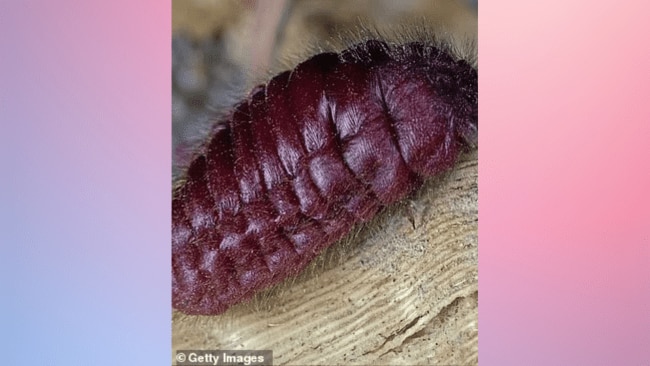Mum finds 'gross' ingredient in Easter biscuits: ‘Never eating these again!’
"Are you kidding me? To me, that is just toxic!"
Lifestyle
Don't miss out on the headlines from Lifestyle. Followed categories will be added to My News.
In a jaw-dropping revelation, a young mum discovered a disturbing ingredient lurking in what seemed like innocent treats for her kids.
Little did she know that her quick purchase of mini Easter biscuits would lead to a stomach-turning discovery as she jumped on TikTok to share the news.
Want to join the family? Sign up to our Kidspot newsletter for more stories like this.
Sugar, water, crushed-up bugs… wait, what?!
Upon casually glancing at the ingredients list, Katrina Mitra thought she had found a safe option for her kids, given that the treats were free from dairy and eggs.
However, her excitement quickly turned to horror when she uncovered a mysterious word: Cochineal.
Katrina did what anyone would do and jumped onto Google to search to unravel the truth behind this unfamiliar ingredient.
What she unearthed left her utterly disgusted.
Cochineal, as it turns out, is none other than a scaled insect, dried and crushed to produce a natural dye for food and textiles.
Yes, you read that right—bugs in biscuits!
Introducing our new podcast: Mum Club! Listen and subscribe wherever you get your podcasts so you never miss an episode.
"Are you kidding me?”
Expressing her repulsion, Katrina couldn't fathom why such an ingredient would find its way into something as innocent as a biscuit.
"Are you kidding me? To me, that is just toxic," she exclaimed.
As news of Katrina's unsettling discovery spread across the internet, her video quickly went viral, sparking a storm of reactions from concerned parents and outraged citizens alike.
“OMG I just googled what products have cochineal in it, and there are heaps of products I consumed already that has this!!! I want to cry,” exclaimed one commenter.
“I literally just saw a TikTok vid of some guy exposing TimTams that have cochineal in them and they’re my fav chocolate,” lamented another.
"Just because it's been used for centuries doesn't make it okay to be eating BUGS," cried another.
But not everyone shared Katrina's sentiments. Critics were quick to point out that cochineal has been used for decades and is deemed harmless by regulatory authorities.
RELATED: Is mouldy bread OK to eat? A food expert reveals the truth

What’s the big deal?
While many were outraged by the discovery, many more were wondering why Katrina was so surprised.
“Unless you’re vegan, there’s no outrage,” shared one.
“Conchineal is just another animal byproduct. If your kids eat the meat of animals, you’ll be fine with cochineal.
“Wait till you find out how gelatin is made,” they joked.
Another wrote, “...I don't see how it's toxic? It's a natural food dye, no? I'd prefer cochineal over red 40. Plenty of cultures eat bugs.”
RELATED: Aussie shopper left outraged after Kmart shopper's gross act

We went to the expert
We decided to go straight to the top and ask Kidspot’s Food Editor, Elizabeth Macri, to give her expert opinion on this ingredient.
She told us, “I know about the cochineal insect and how it's used to produce natural colouring.
“Most natural colourings come from plants, microbes and insects. I guess most people think they come from plants or roots.
“I'm not sure if people realise that a really important ingredient in soy sauce is mould. The process of making soy sauce makes it safe for consumption, though.”
She also pointed us in the direction of discovering some other ingredients in your favourite foods you’d probably prefer not to know about.
RELATED: Why you should never let kids drink from the hose

Queasy tummy? You might want to stop reading here!
We did some digging into other ingredients you may wish weren’t found in everyday foods, and we’re warning you to stop reading if you’re feeling queasy.
Beaver anal glands in vanilla flavouring
We told you to stop reading!
Castoreum, a secretion from the anal glands of beavers, is sometimes used to enhance the flavour of vanilla.
While it's approved and considered safe for consumption, the thought of ingesting beaver secretion might make you think twice before indulging in that vanilla treat.
Gelatin from animal bones
Love your creamy yoghurt for breakfast?
You might be surprised to learn that the silky texture could come from gelatin derived from animal bones!
Gelatin is commonly used as a thickening agent in yogurt and other dairy products, giving them that smooth consistency. It's a common ingredient, but one that might give vegetarians and vegans pause.
Fish bladders in beer and wine
If you enjoy kicking back with a cold beer or a glass of wine, brace yourself for this revelation: some alcoholic beverages are clarified using isinglass, a substance derived from fish bladders!
It helps remove impurities and yeast, resulting in a clearer final product.
While it's not present in all beers and wines, it's definitely a shocker for those who prefer their drinks without a side of fish.
Wood pulp in shredded cheese
Love sprinkling shredded cheese on your pasta or nachos?
You might be surprised to learn that it could contain a not-so-appetizing ingredient: cellulose, aka wood pulp.
Cellulose is added to shredded cheese to prevent clumping and improve texture.
While it's considered safe for consumption, it's certainly an unexpected addition.
With all that being said, if you ask us, sometimes ignorance is bliss!
More Coverage
Originally published as Mum finds 'gross' ingredient in Easter biscuits: ‘Never eating these again!’





